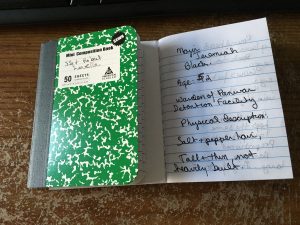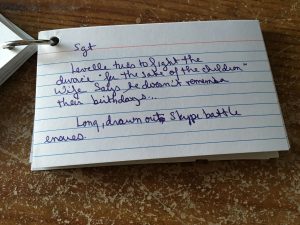Today, I want to give a shout-out to some real-life muses that have helped me along these past few years.
I have been lucky to have such good people around me to give me inspiration and ideas, and, most of all, inspire me to write. They all follow the cardinal rule of improvisation: “Yes, and…” That is, whatever they do, your reaction should accept what they have done and build upon it. Because most of my muses have been found using role playing (RP) games, this is not an unusual occurrence. Sometimes, though, people take advantage of the rule and “God-mod” their characters so that nothing is impossible for them. It’s tough to play against perfect characters.
Anyway. One of my most important muses was my husband. He still inspires me due to his life. He was a carnie for 4 years, and I joined him on the circuit for one summer so I could get the idea of what it was like. That summer still inspires me. He was a biker, and that inspired me with Knight of the Road, a character I play on Champions Online and City of Heroes. I also have a story on Tumblr called Leopard Knight (which badly needs to be updated). My husband was into the military, but had never joined (though he wanted to so badly), and inspired me with the War Mage series. I learned enough military terms to be dangerous, which is how I wrote War Mage.
He probably would be proud of me, seeing my book in print and in audio. My second book is dedicated to him. He, unfortunately, is no longer with us, but he is always in my memory.
Speaking of City of Heroes, Cedric is another muse I worked with. He fell into the god-mod rule sometimes, also a rule-monger. We played characters from Vampire: The Masquerade and Werewolf: The Apocalypse, and other White Wolf types of characters. Some of the other players were god-modders, playing “races” that were “banned” or exiled. Cedric would jump on that with both feet, which pissed off some people. But he worked with me and Grimaulkin’s character. I wouldn’t have fallen so much in love with Grim if it wasn’t for him.
Steven is another muse. He’s more of a ski-fi type of guy. I never did sci-fi–too much science! He inspired me with his Emerald Flight series, which I developed a character he enjoyed and has taken in for his own, Rusty Raynes. I loved playing Rusty. He’s a constantly recovering alcoholic, drug addict, and all around junkie who is an excellent engineer (he might have some telepathic connection with machines, or at least it seems that way). I can’t wait to see what he does with him in his upcoming book.
Four other guys ended up moving from City into Champions. Chris helped me develop Grim and other characters. Chris was an RP nut, but he was sensitive to his characters. We developed Knight’s flaws with his characters. Aaron also came along. He worked with Grim (played his “boyfriend” for a time, too and was there at Grim’s rebirth). Chris disappeared; I still get pokes from Aaron every once in a while. Both of them did “Yes, and…but…” which sometimes pissed me off, but helped me to stretch my imagination and my mind outside of the box. Both of them also validated that I could play/write a gay man well.
Two other muses still inspire me today. They have consistently inspired me over the last…wow, has it been almost 5 years? Jon is an RP gamer and, I think, a GM (game master) for some games he plays offline. So he’s very familiar with how RP works. He presents his characters with such wide-ranging issues that I really have to stretch to both accept and work with. He’s not wild or crazy (well, he could be); he’s very realistic, keeping his characters grounded in reality. He’s witty, funny, and sensitive to how my characters act and react. His ERP (you figure out what that means) is second to none. I’ve learned so much from him.
Joel is also a muse that still inspires me. We have so many pairings that I think 3/4 of my guys have touched his characters, literally and figuratively. He’s always accepting of the “Yes, and…” rule. And, most of the time after a session of RP with him in Champions, I walk away with a story idea that I need to write down. It usually finds its way into 800 Words–except recently because I’m working on War Mage. Because he’s so accepting of the “Yes, and…” rule, I often write myself into a corner that he remembers or points out and I have forgotten. He must take better notes or have a more cavernous memory than I do to remember the details of what one of my minor character did six months ago. He’s also consistent, so I can sometimes take his characters and write about them. And he lets me!
The writers’ muses are in conjunction with the well that constantly needs replenishment. The water in the well is only as good as the inspiration and imagination that draws from it. The “Yes, and…” rule is a cardinal one for muses. They should accept what’s going on, accept you and your character, and work with them without judgement. Hopefully, they’re living, breathing people with imaginations, too, who are interested in seeing where you’ll send your characters–and maybe theirs.

